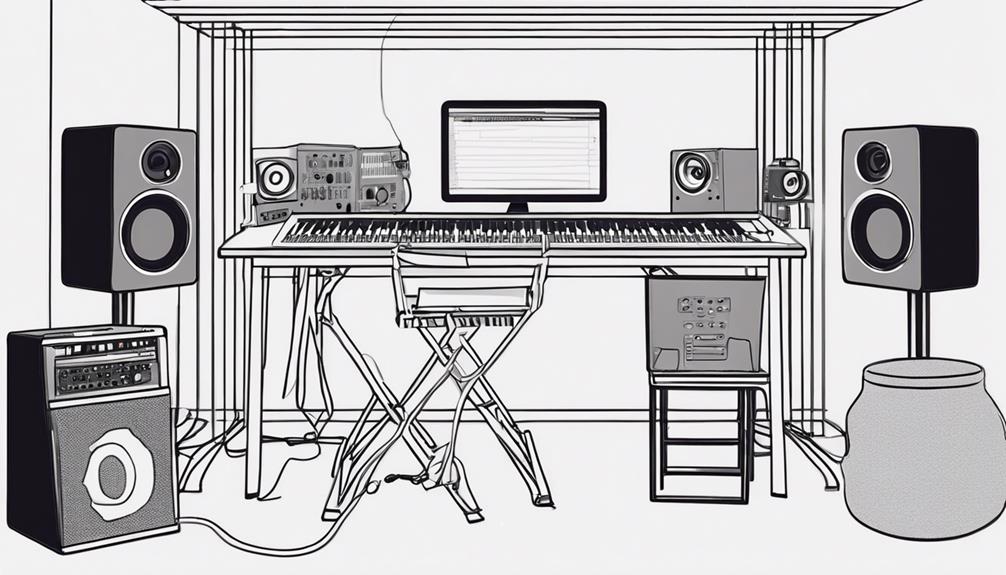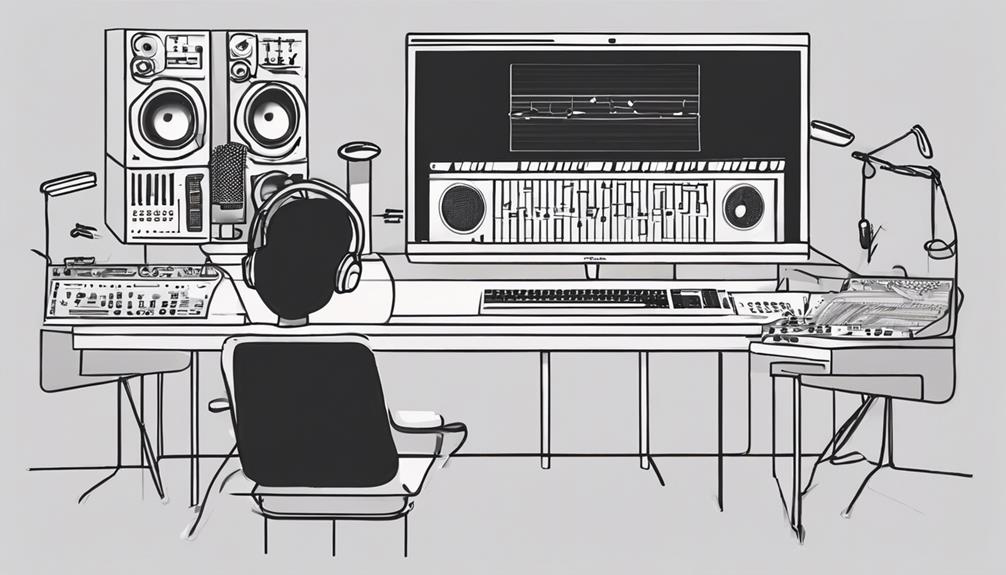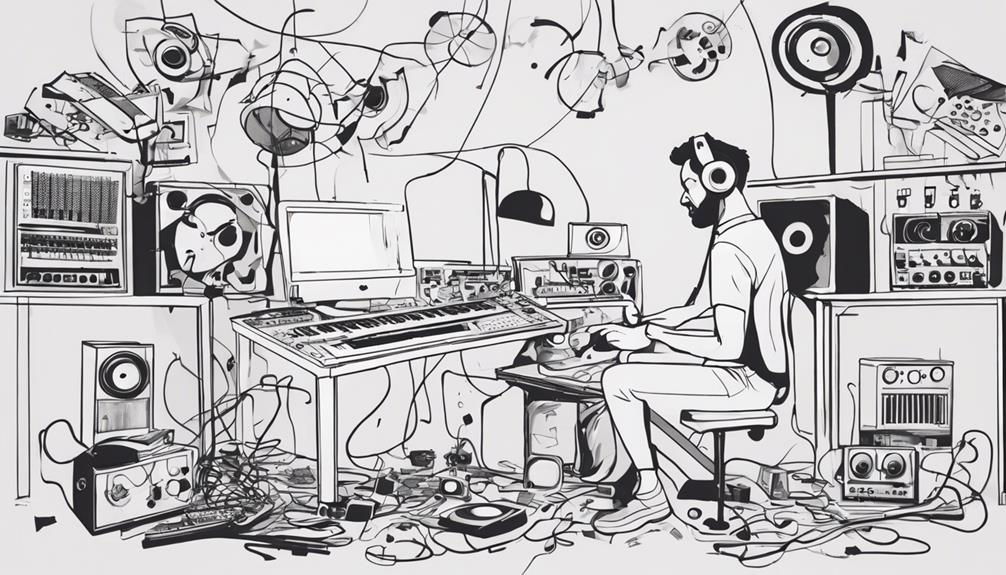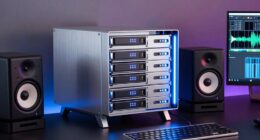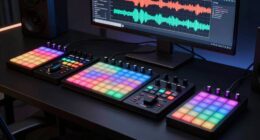To start a music production library successfully, create a diverse collection that includes various genres, instrumental tracks, and sound effects. Optimize distribution channels for efficiency and security. Choose high-quality file formats like aif or wav and embed metadata effectively for organization. Implement fair licensing strategies to maximize revenue potential. Organize tracks by labeling with metadata and consistent naming conventions. Promote your library using social media and digital marketing strategies. Offer customizable licensing options to clients. By following these steps, you can create and monetize your music production library effectively. Find out more ways to enhance your library! Additionally, focus on building strong relationships with independent artists and producers to continuously expand your library’s offerings. When starting a music production company, it’s crucial to stay updated with industry trends and emerging technologies to keep your library competitive and appealing. Make use of analytics tools to track usage patterns and adapt your catalog to meet the specific needs of your target audience. Encouraging customer feedback and staying responsive to client needs are also essential aspects of refining your library and ensuring long-term success. Learning how to run a music company involves not just the creative side but also mastering the business aspects, such as budgeting, networking, and legally protecting your assets. By consistently evolving your strategies and offering unique, high-quality content, you can solidify your position as a go-to resource in the competitive music production industry.
Key Takeaways
- Build a diverse music collection with various genres, vocals, instrumentals, and sound effects.
- Ensure high-quality file formats like aif or wav with embedded metadata for efficient distribution.
- Understand licensing types, offer fair pricing, and maximize revenue with tiered options.
- Organize tracks by genre, mood, tempo with consistent naming conventions for easy access.
- Utilize social media, digital marketing, and customizable licensing to promote and monetize your music library.
Building a Diverse Music Collection
How can you curate a diverse music collection to meet a wide range of production needs efficiently?
When building your music library for production purposes, it's important to include a variety of genres such as pop, rock, jazz, and classical. This diverse selection ensures that you have options to suit different project requirements and target audiences.
Additionally, incorporating instrumental tracks into your collection is vital. Instrumental music, along with sound effects and ambient tracks, can cater to a wide array of production needs, providing background music that enhances the overall impact of your projects.
To further enhance the versatility of your music library, consider including tracks with varying tempos, moods, and instrumentation. This diversity allows you to find the perfect musical accompaniment for any scene or project.
Licensing popular genres like hip-hop, electronic, and cinematic music can also broaden the appeal of your collection, attracting a wider audience and meeting different production demands.
Lastly, make sure that your music library includes both vocal and instrumental tracks to accommodate various project requirements effectively.
Ensuring Convenient Distribution Channels
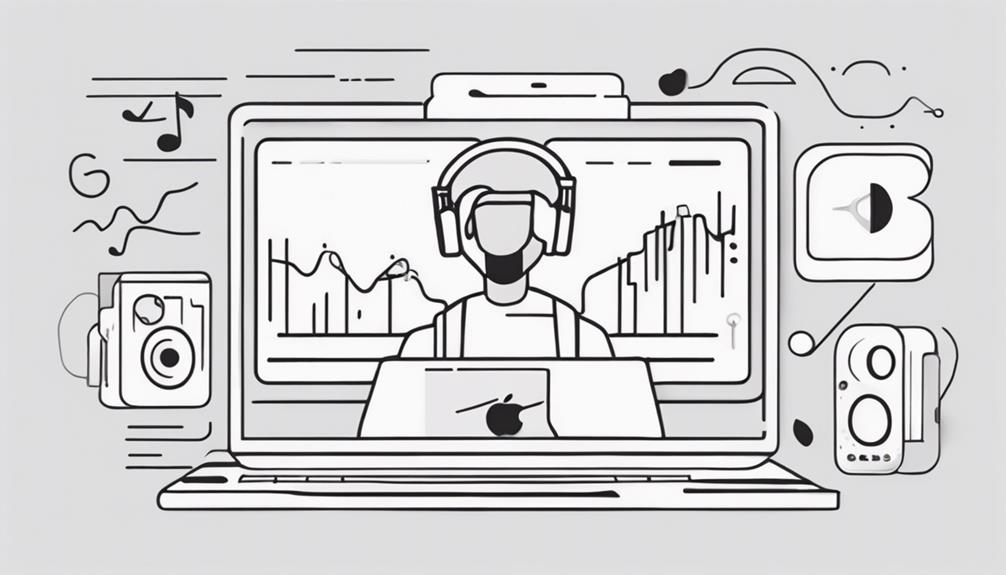
Consider the most suitable method for distributing your music production library to clients, taking into account convenience and security factors. When deciding on a distribution channel, weigh the pros and cons of web delivery versus physical hard drive options.
Web delivery offers easy access for clients, allowing them to download files quickly, while physical hard drives provide a tangible and secure method for distribution. Prioritize efficiency and reliability in your chosen method to meet industry standards and exceed client expectations.
Opt for file formats like aif or wav with quality settings of 48k16 or 24-bit to guarantee compatibility and maintain professional standards in distribution. Additionally, embedding metadata effectively in your music files using tools like iTunes or Soundminer will enhance searchability and organization.
Choosing File Formats and Metadata
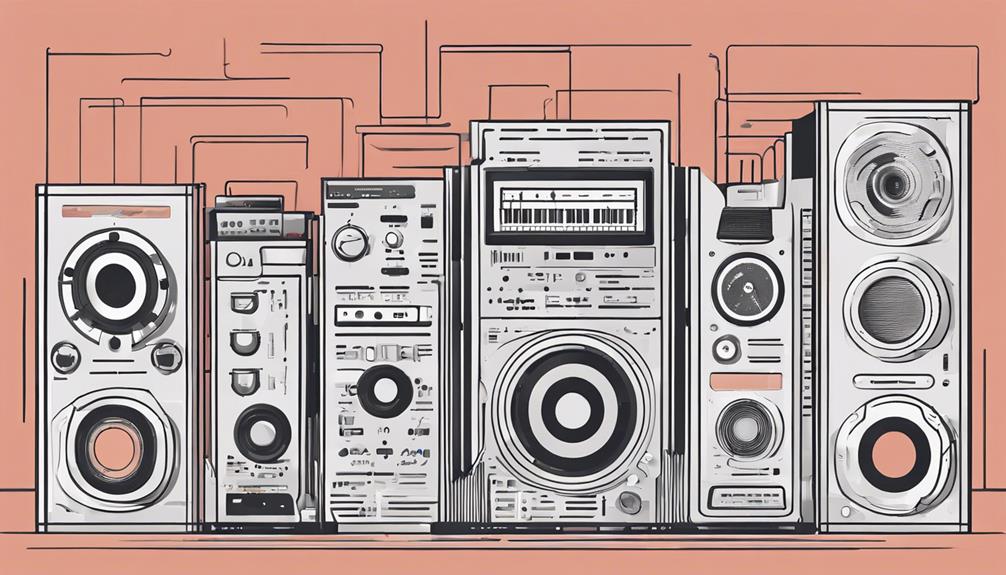
When establishing your music production library, prioritize selecting appropriate file formats and embedding metadata effectively to enhance organization and searchability.
For high-quality audio in your music library, opt for industry-preferred file formats like aif or wav. Aim for 48k16 or 24-bit quality to meet professional standards and guarantee compatibility with various systems.
Embedding metadata in your audio files is essential for efficient management and easy searchability. Tools such as iTunes or Soundminer can aid in effectively organizing and utilizing metadata. Make sure that the metadata is accurate and complete to present a professional and well-organized music production library.
Implementing Licensing Strategies
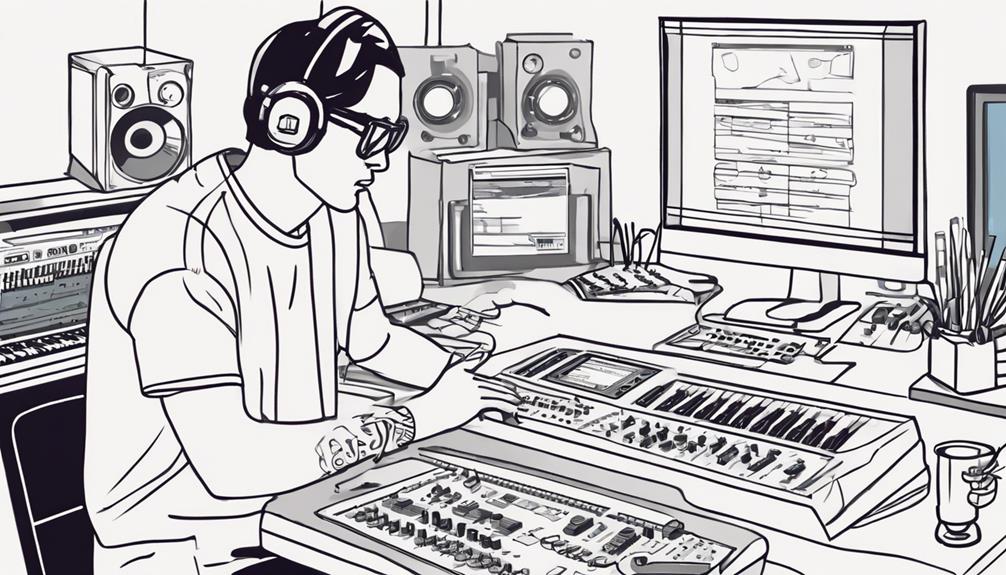
When implementing licensing strategies for your music production library, you'll need to grasp the basics of setting fees and understanding various license types like sync licensing and performance rights.
Deciding between exclusive and non-exclusive licenses will play an important role in maximizing your revenue potential. To guarantee fair compensation and protect intellectual property, pricing strategies should align with market trends and the value of the music being licensed.
Licensing Basics Explained
Understanding the basics of music licensing involves grasping different types of licenses such as sync, performance rights, and mechanical licenses. When setting up your music library, licensing agreements play an essential role. These agreements not only protect your music but also establish pricing structures and define terms for usage.
By implementing licensing strategies effectively, you guarantee fair compensation, safeguard your intellectual property, and regulate the rights of usage for your music. Offering exclusivity options within licensing agreements can add value to your music and attract potential clients.
Transparent and fair pricing structures are key components of licensing agreements, as they help in building trust with clients and streamlining the licensing process. By mastering the fundamentals of licensing, you can protect your music, maximize its monetization potential, and establish a solid foundation for your music production library.
Exclusive Vs. Non-Exclusive Licenses
To effectively implement licensing strategies in your music production library, it's essential to understand the differences between exclusive and non-exclusive licenses. Exclusive licenses grant sole rights to a single client for a specific music track, often commanding higher fees due to limited usage rights. On the other hand, non-exclusive licenses allow multiple clients to use the same music track simultaneously, offering more flexibility and potential for broader distribution.
When deciding between exclusive and non-exclusive licensing strategies, it's vital to balance revenue potential with client reach. Exclusive licenses may provide a higher immediate return, but non-exclusive licenses can lead to increased exposure and long-term revenue generation.
Maximizing Licensing Revenue
To maximize your licensing revenue and effectively implement licensing strategies in your music production library, consider factors such as track popularity, usage scope, and client budget constraints.
When setting licensing fees, take into account the demand for each track, the intended use by the client, and their financial limitations. Offering tiered licensing options, like basic, standard, and premium licenses, allows you to cater to a variety of client needs while maximizing your earning potential.
Implementing licensing bundles for bulk purchases or recurring clients can incentivize continued business and boost overall revenue.
Utilize detailed licensing agreements to establish clear usage rights, royalty structures, and any exclusivity terms associated with each piece of library music. Customized licensing packages tailored to specific projects, events, or unique client requirements can also help you capture additional revenue streams.
Organizing Tracks Effectively
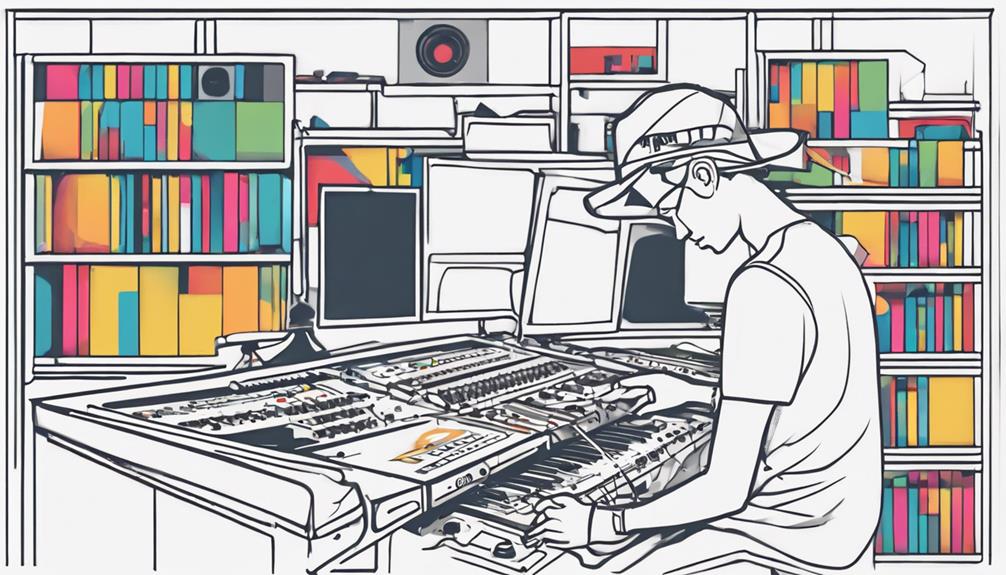
When organizing tracks in your music production library, remember to label each track with essential metadata such as composer name and relevant details.
Utilize a consistent naming convention using underscores for spaces to maintain uniformity and ease of search.
Categorize tracks by genre, mood, or tempo, and create a structured folder system for efficient organization.
Track Metadata Management
Embedding metadata in your music tracks is crucial for efficient organization and searchability in your music production library. By including details such as composer name, track title, genre, and mood, you enhance the accessibility and usability of your music catalog.
To effectively manage track metadata, consider utilizing tools like Soundminer or iTunes for seamless integration. Guarantee that your metadata is accurate and complete to maintain a professional and well-organized music library.
- Categorize tracks by genre, mood, tempo, and other relevant tags to enhance search functionality.
- Organize files with clear labeling and standardized naming conventions for easy identification.
- Utilize structured folders to categorize and store your music tracks systematically.
- Implement a consistent approach to embedding metadata to streamline the search process.
- Regularly review and update metadata to ensure information remains relevant and up to date.
Folder Structure Design
Organize your music tracks effectively by designing a structured folder system that categorizes them by genre, mood, tempo, and instrumentation.
Start by creating main folders for different music genres such as Pop, Rock, or Classical to help categorize tracks efficiently. Within each genre folder, utilize subfolders to further classify tracks based on mood, tempo, or instrumentation.
Additionally, include folders for alternate mixes, short edits, and loops to provide a variety of options for clients.
To maintain organization, use a consistent naming convention for files within the folders. Regularly update and maintain your folder structure to accommodate new tracks and ensure easy access to your music library.
Tagging System Implementation
Consider implementing a thorough tagging system to effectively organize your music tracks by genre, mood, tempo, and instrumentation for maximum searchability and accessibility in your production library.
To successfully implement this system, follow these guidelines:
- Include metadata tags like composer name, track title, and keywords for enhanced discoverability.
- Utilize descriptive tags to categorize tracks based on their potential usage in various media projects.
- Guarantee consistency in tagging formats and conventions across all tracks to streamline organization.
- Regularly update and maintain the tagging system to reflect new additions and client preferences.
- Use tags for genres, moods, tempos, and instrumentation to facilitate easy filtering and searching.
Promoting and Monetizing Your Library
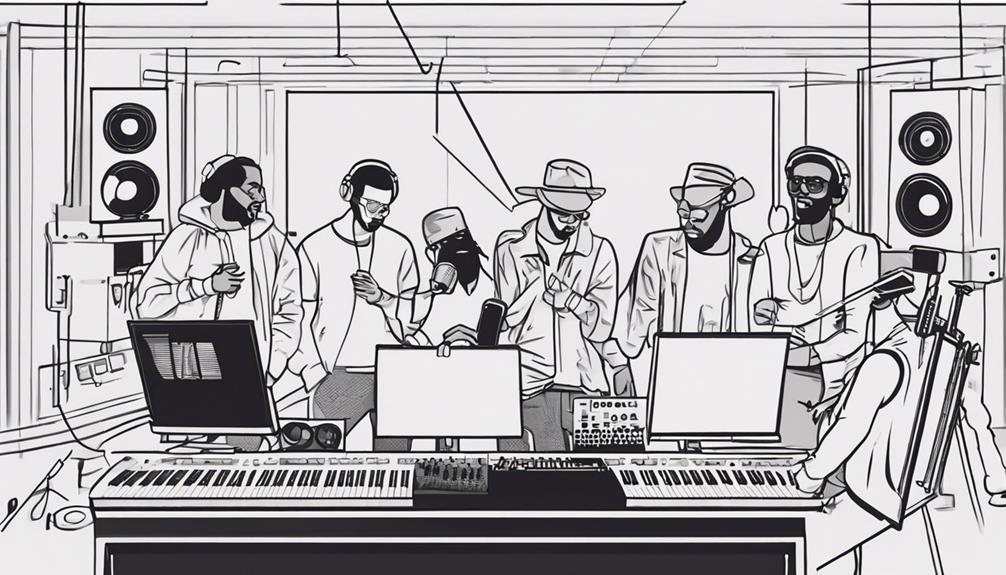
To effectively promote and monetize your music production library, focus on utilizing social media platforms like Instagram, Facebook, and Twitter. These platforms offer a vast audience reach and engagement potential. Additionally, implementing digital marketing strategies such as email campaigns, Google Ads, and influencer partnerships can drive traffic to your site and increase visibility. By offering customizable licensing options for clients based on usage, duration, and budget, you can maximize revenue potential and cater to a wide range of customers.
| Strategies | Description | Benefits |
|---|---|---|
| Social Media | Utilize platforms like Instagram, Facebook, and Twitter to engage with your audience and promote your music. | Reach a wider audience, increase brand visibility |
| Digital Marketing | Implement email campaigns, Google Ads, and influencer partnerships to drive traffic to your music library site. | Increase site traffic, attract potential clients |
| Sync Licensing Deals | Collaborate with content creators, filmmakers, and advertisers to secure sync licensing deals and expand reach. | Expand music library reach, generate additional revenue opportunities |
Frequently Asked Questions
Can You Make Money From Music Library?
You can make money from a music library through sync licensing, performance rights, and mechanical licenses. Income per track may seem small, but it can be recurring. Collaborating with libraries and artists can open up income opportunities.
How to Write Production Library Music?
Feeling overwhelmed by the idea of writing production library music? Start by capturing emotions with versatile tracks. Bridge the gap between mainstream and elite styles, crafting professionally produced tunes that are ready for broadcast use.
How Do I Get My Music Into a Music Library?
To get your music into a library, research and approach suitable libraries, prepare a high-quality portfolio, submit to various libraries, follow guidelines precisely, and build relationships with managers and supervisors for better placement opportunities.
How Much Money Can You Make Licensing Music?
When licensing music, your earnings potential is vast. Top-tier composers can rake in six to seven figures annually. Factors like usage, duration, and media type influence licensing fees, ranging from hundreds to thousands per track.
Conclusion
To sum up, starting a music production library can be a rewarding venture with the right strategies in place.
Did you know that the global music licensing market is projected to reach $5.73 billion by 2024?
By building a diverse collection, ensuring easy distribution, and implementing effective licensing and promotion tactics, you can monetize your library and tap into this growing market.
Get started today and watch your music library thrive!


